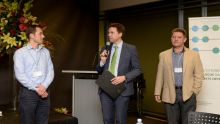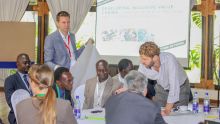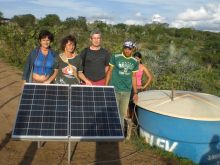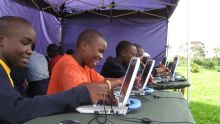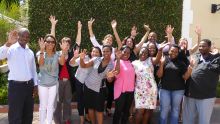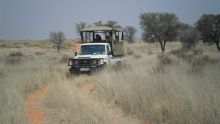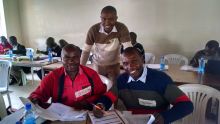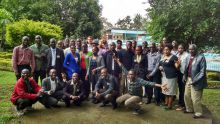It would be an understatement to say that finance is one of the big issues being discussed at COP21. I’ve managed to pop into a number of side events on the topic and it comes up in even the most casual of conversations.
- Is it not time that we start to build green technology development capacity in developing countries?
In just five days, politicians, policy makers, NGOs, businesses, entrepreneurs and activists will head to Paris, for the 21st Conference of the Parties (COP), to see whether the world can hammer together an agreement to move the world away from catastrophic climate change before time runs out. Will they be successful?
- When I was in Nairobi a few weeks ago, our team at SEED brought together more than 500 people at our 2015 SEED Africa Symposium to discuss the latest developments in social and environmental entrepreneurship.
- "Then the refugees came and started to cut down trees and soon there was no forest left, (..) The locals also chopped trees and made charcoal to sell to the refugees." (UNHCR, 1996)
Coffee has been the backbone of the agriculture-based economy of Tanzania for the last 100 years providing employment for an estimated 2 million people directly or indirectly, according to the Tanzania Coffee Research Institute (TaCRI). However, low productivity is making it difficult for farmers to retain their livelihoods.
A few weeks ago I was in Nairobi where we (SEED) held our annual SEED Africa Symposium. The event was the biggest one yet, with over 500 representatives from government agencies, the private sector, civil society organisations and academic institutions from 34 countries; all gathering to build bridges for impact.
"Where many conventional start-up enterprises fail after only two years, more than three out of four SEED Winners have not, that is the major outcome of this flagship report“, Ibrahim Thiaw, UNEP Deputy Executive Director and UN Assistant-Secretary-General.
- How can people living at the base-of-the-pyramid (BoP) be integrated into global value chains and improve their livelihood on a long-term perspective? One answer clearly is: by fostering Inclusive Business Models (IBM).
The growth and success of green and inclusive business models with high impact potential is central to the challenges many emerging economies are facing.
- Water for Life – innovative and entrepreneurial ways of storing water in semi-arid regions of Brazil
Access to water is not only about meeting basic human needs; it is critical to sustainable development, too.
“It’s in your hands now”: with this sentence, Nelson Mandela passed on his legacy to make a difference in the world to a new generation at his 90th birthday.
- Today, the 30th June, is a significant date: it is exactly 8 years since I left the UK’s Department for Environment, Food and Rural Affairs to join the SEED Initiative, and it now marks a transition from my role as Executive Director of SEED, to Chairman.
- A recent large-scale survey published by Zeppelin University and Siemens Stiftung generally support the idea that social enterprises can have a positive impact on poverty reduction. However, it also reveals some caveats, which have led us to derive concrete recommendations for action.
The Millennium Development Goals have shaped development cooperation in the last 15 years, and there has been progress towards eliminating poverty worldwide. Nevertheless, much remains to be done.
- While it may have gone unnoticed to many, the 28th of May was the International Menstrual Hygiene Day; a day initiated by WASH United to create awareness around the right of women and girls to hygienically manage their menstruation – in privacy, safety and with dignity – where ever they are.
- In the middle of the 19th century, the invention of the telegraph was transforming societies: instead of sending letters by horses or ships which could take weeks or even months, messages could now be delivered within minutes.
- According to World Bank, South Africa ranks as an upper-middle income economy, representing the second-largest economy in Africa. While disposing of an abundant supply of natural resources and a modern infrastructure, unemployment, poverty, and inequality remain a challenge.
- Bees play a vital part in our natural ecosystems as they are responsible for the pollination of many fruit, nuts, vegetables and other species.
- Today, on March 28th, thousands of cities around the world will turn off their lights during Earth Hour to draw attention to the urgent need to act on climate change. Even though the devastating impacts of climate change are becoming ever more visible, global carbon emissions – one of the main contributor to climate change – continue to rise at an alarming rate.
- This year, World Water Day* emphasises the crucial relationship between water and sustainable development. Indeed we all know that water is fundamental to our well-being and when we think of water, the first thoughts that often spring to mind are access to drinking water or water for food production.
- In October 2014, UN Women Executive Director proposed 2030 to be the expiry date for gender inequality (UN Women). How can we make this bold goal a reality? Where do we start? Let’s start by envisioning the world in 2030.
- It has long been acknowledged that the equilibrium between humans and wildlife is one that can hang in the delicate balance at the best of times, a devastating one-sided scaling at worst.
- SEED is happy to announce today a call for applications in Burkina Faso.
The two winning eco-inclusive enterprises of the 2016 SEED Awards in India are Green the Map and Waste Ventures India!
- Want to set up an eco-inclusive enterprise? SEED announces the second round of the SAG-SEED Starter Months in Kenya
The SwitchMed Connect Conference is an annual gathering of stakeholders of the Mediterranean ecosystem to share stories, expertise and experience on eco-inclusive entrepreneurship. SEED was invited to contribute to the panel “Green Entrepreneurship Training and Support Programmes”.
- SEED is currently looking for eco-inclusive enterprises wishing to replicate their business model.
- For a long time, waste management and recycling were primarily discussed in the context of environmental preservation. However, with natural resources becoming scarcer and prices of raw materials increasing, it is no surprise that materials and energy recovered from recycling waste are gradually recognised as a valuable commodity, particularly by enterprises.



